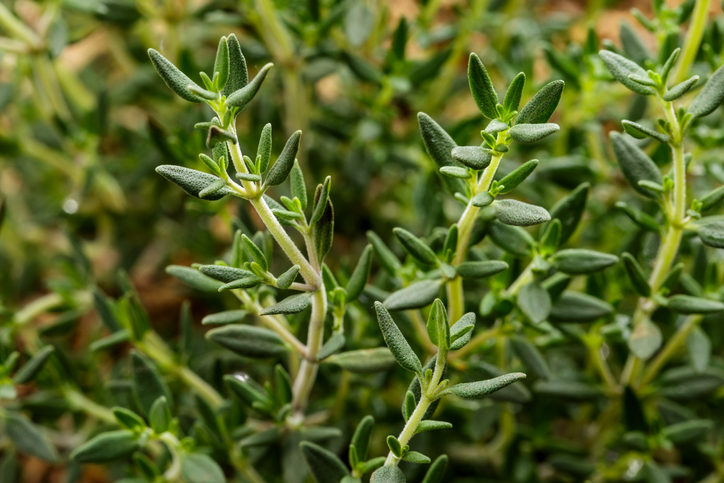Thyme, an herb native to the Southern Mediterranean, is now grown around the world. Thyme grows best in loose, well-draining soil, and grows quickly in sunny locations. It is classified as an evergreen herb, and it blooms with small flowers of white and purple. Many people may not know that it is related to oregano, and is also part of the mint genus. Its culinary and therapeutic uses are well known.
Interesting thyme facts: This popular culinary herb has a long history of use as a medicinal healer and way to safeguard health. For example:
• In the Roman era, thyme was consumed to prevent and treat poisoning (1).
• Before refrigeration and food safety laws, including thyme in recipes offered some protection against spoiled meat and food-borne illness (1).
• Prior to modern antibiotics, oil of thyme was used to medicate bandages (1).
The first recording of thyme’s use was more than 3,000 years ago. There were writings of the Romans using thyme as a flavoring additive for cheese and alcoholic beverages, while the Egyptians used it as an embalming fluid, showing the versatility of this herb. The father of Western medicine himself, Hippocrates, recommended it for respiratory conditions and digestive support.
Thyme’s benefits include antifungal and antibacterial properties, free-radical scavenging properties, oral health support, occasional mood support, and bug repellent action. Thyme oil is used in tea with honey for a sore throat.
Phenols in the plant, including eugenol, carvacrol and thymol, deliver benefits. And if you've ever enjoyed it as a culinary herb, the flavor is pleasing, strong, and distinct. Overall, this is a delicious, aromatic, incredible plant.
Thyme is used as a dried herb, fresh from the garden, or as an essential oil. It has no concrete documented writings of side effects, but as with all herbs, consulting a medical practitioner is always recommended. I would advise that those who are pregnant or breastfeeding, as with all herbs, have a conversation with their doctor. Allergic reactions to thyme may be a concern, if there is one at all, so it is advised to start low and slow when using it as both a supplement and as a spice.
References
1) Dr. Axe What is Thyme? Thyme Benefits for Your Throat, Heart, and Mood, by Annie Price, CHHC, January 17, 2020










